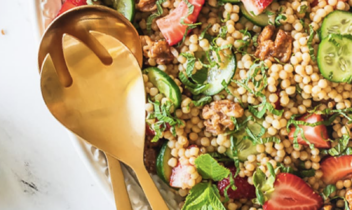
How do I educate my children about phytonutrients and the benefits of eating a colorful variety of fruits and vegetables?
Answer
Great question! There is a variety of phytonutrients (or phytochemicals) that support human health, and their presence in plants affect the color of fruits and veggies. Phytonutrients in addition to vitamins and minerals work together to: 1) keep us healthy, 2) maintain a healthy weight, and 3) fight off diseases and bacteria. It has been estimated that up to 4,000 phytonutrients exist, so in order to get all the nutrients our bodies need, it is important to eat a colorful variety of fruits and vegetables to meet the daily recommendation. With this in mind, a rainbow can work as a great analogy. Use the following table as a guide for your discussion.
| Color | Fruit/Veggie Examples | Health Benefit |
| Orange/yellow | Carrot, orange, pineapple | Healthy heart and eyes, prevent a cold |
| Red | Tomato, strawberries, beets | Healthy heart and good memory |
| Blue | Blueberries, eggplant, purple potatoes | Prevent cancer; good memory |
| Green | Green apple, avocado, spinach | Healthy eyes, strong bones and teeth |
| White | Cauliflower, mushrooms, onions | Healthy heart and prevent cancer |
As you talk about each color, have samples of the fruits and veggies available for taste testing. This is a great way for children to be adventurous and try something new. Our website has a Healthy Kids section with a variety of fun, educational activities to teach children about fruits and vegetables. Have fun!


